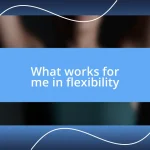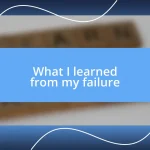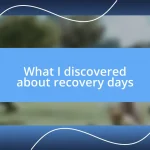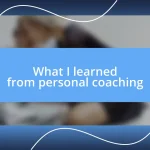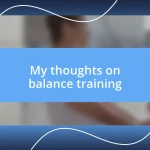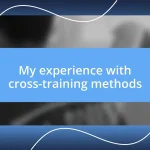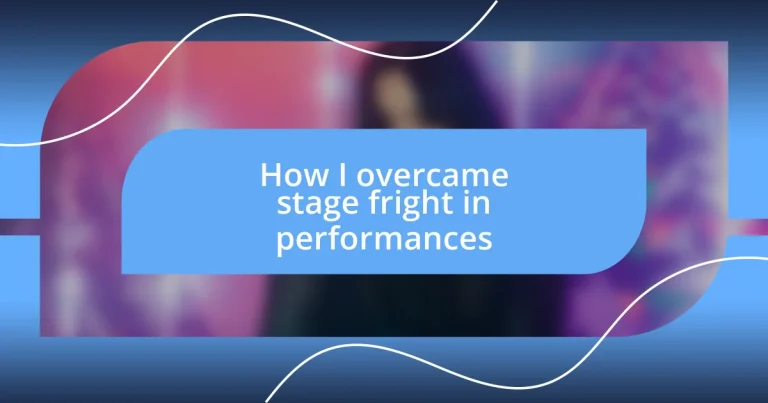Key takeaways:
- Stage fright often originates from past experiences and deep-seated fears, making self-reflection and understanding vital for managing anxiety.
- Practical techniques like visualization, breathing exercises, and practicing in front of supportive audiences can significantly reduce fear and build confidence.
- Consistent practice and acknowledging progress foster resilience, transforming performance anxiety into a more positive experience and connection with the audience.
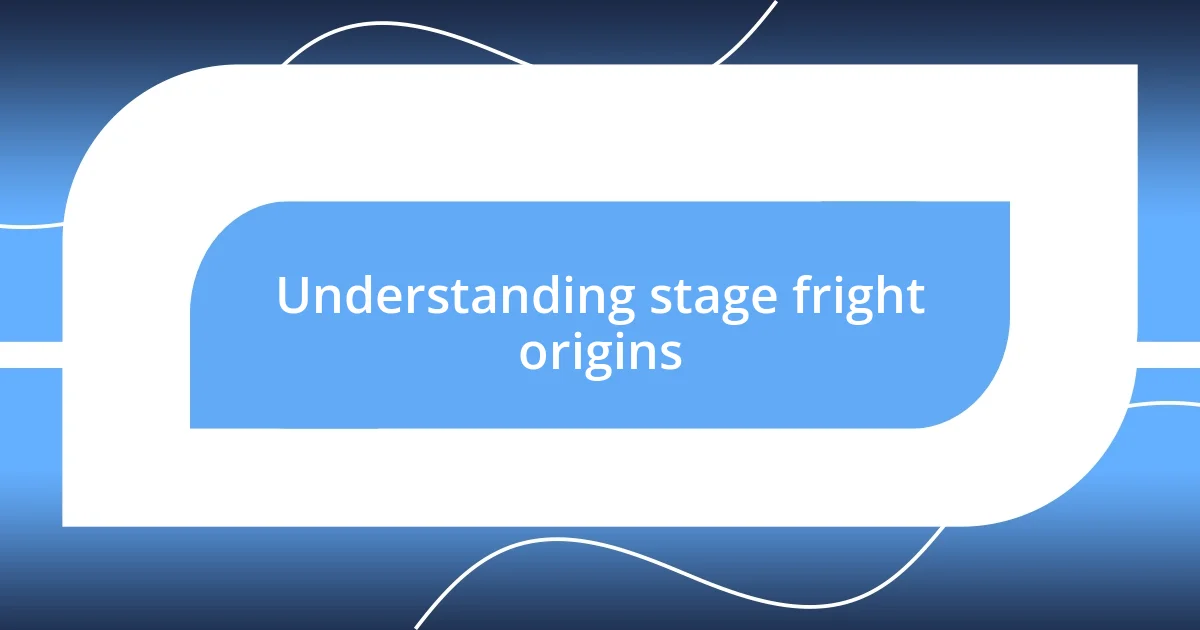
Understanding stage fright origins
Stage fright, or performance anxiety, often stems from a mix of past experiences and deep-seated fears. I remember my first school play; the thought of being watched by my classmates left me feeling bare and exposed. Have you ever felt that vulnerability when stepping onto a stage? It’s that raw emotion that many performers can relate to, and it often traces back to moments of self-doubt or criticism.
Many factors contribute to this anxiety, including fear of judgment and perfectionism. Personally, I found that striving for an unattainable ideal only amplified my discomfort. There were times when I wondered, “What if I forget my lines?” or “What if I stumble?” These questions can paralyze even the most seasoned performers. The pressure we put on ourselves often stems from early performances where we may have felt inadequate.
Connecting with those origins can be enlightening. Realizing that my stage fright was rooted in my childhood experiences—and not merely my talent—allowed me to reassess my approach. Have you considered what drives your fear? Understanding these origins not only helps in managing anxiety but also paves the way for personal growth in our performances.
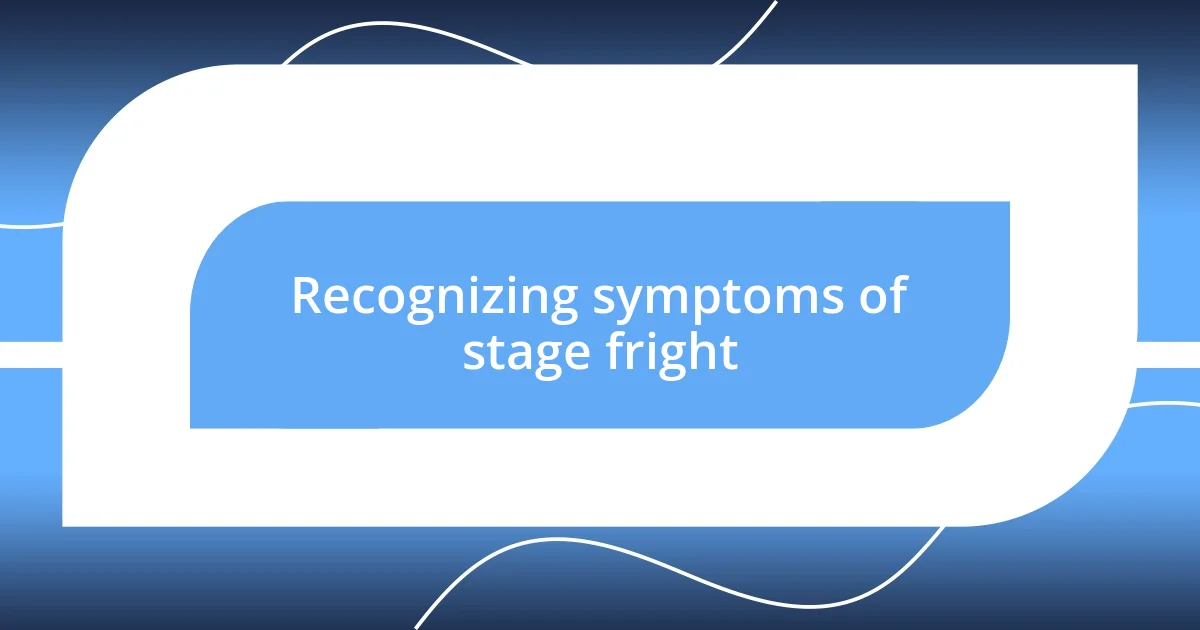
Recognizing symptoms of stage fright
When it comes to recognizing stage fright, I’ve learned to pay attention to the physical and emotional signals my body sends me. One time, just before stepping into a rehearsal, my heart raced, my palms were clammy, and I felt a knot tightening in my stomach. It’s critical to identify these signs early on, as they can help in addressing the anxiety before it escalates.
Here are some common symptoms of stage fright:
- Rapid heartbeat
- Dry mouth or difficulty swallowing
- Nausea or upset stomach
- Shaking or trembling
- Sweating excessively
- Breathlessness
- Negative self-talk or extreme fear of failure
Understanding these symptoms can help performers like us take proactive steps. I often remind myself that acknowledging these feelings is the first step toward overcoming them. It’s about recognizing that you’re not alone in this experience, and you can find ways to manage it effectively.
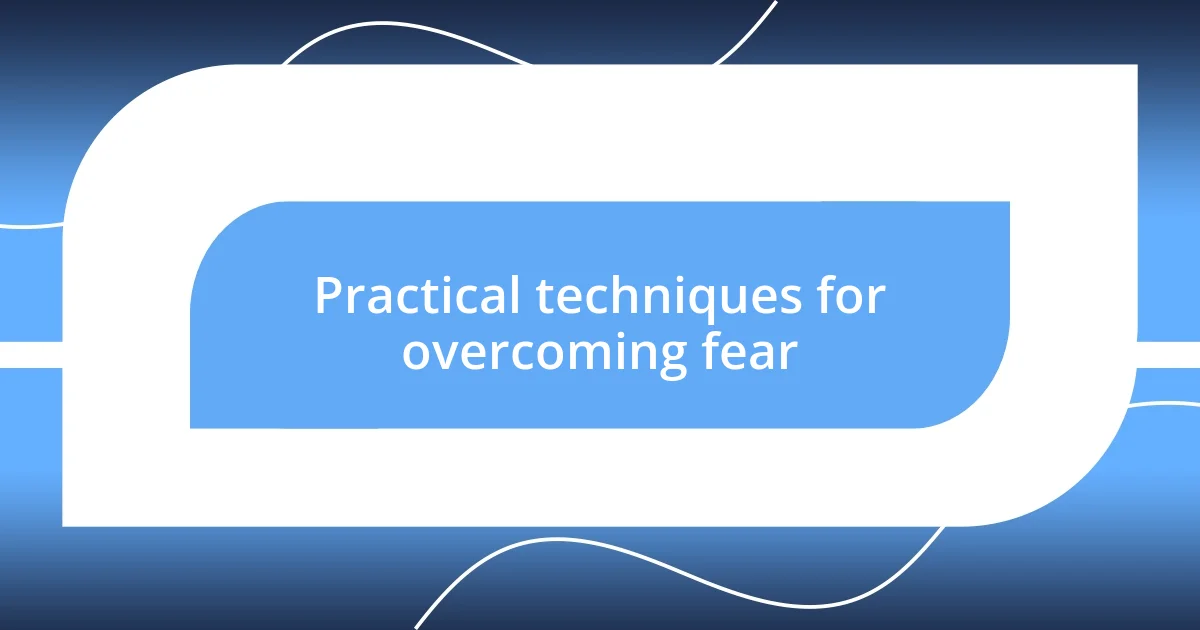
Practical techniques for overcoming fear
One technique that has significantly helped me is visualization. Before a performance, I take a few minutes to close my eyes and imagine myself successfully delivering my lines. This mental rehearsal not only calms my nerves but also allows me to see myself in control of the situation. Have you tried visualizing success? It can create a sense of familiarity that turns anxiety into excitement.
Breathing exercises have also been a game changer for me. I remember a particularly nerve-wracking audition when I felt completely frozen. I took a moment to practice deep, slow breaths, inhaling through my nose and exhaling through my mouth. This simple exercise grounded me and reminded me that I could regain control at any moment. Incorporating breathwork can serve as a quick reset when anxiety strikes.
Lastly, I find that practicing in front of a supportive audience can ease my fears. Whether it’s friends or family, their encouraging presence helps create a safe space. I once invited some close friends to watch me rehearse, and their positive feedback transformed my dread into confidence. Surrounding yourself with understanding people can make a tremendous difference in how you perceive performance situations.
| Technique | Description |
|---|---|
| Visualization | Mental rehearsal to see yourself succeeding, calming nerves. |
| Breathing Exercises | Deep, slow breaths to regain calm and control before going on stage. |
| Practice in Front of Others | Rehearsing in a supportive environment boosts confidence and reduces fear. |
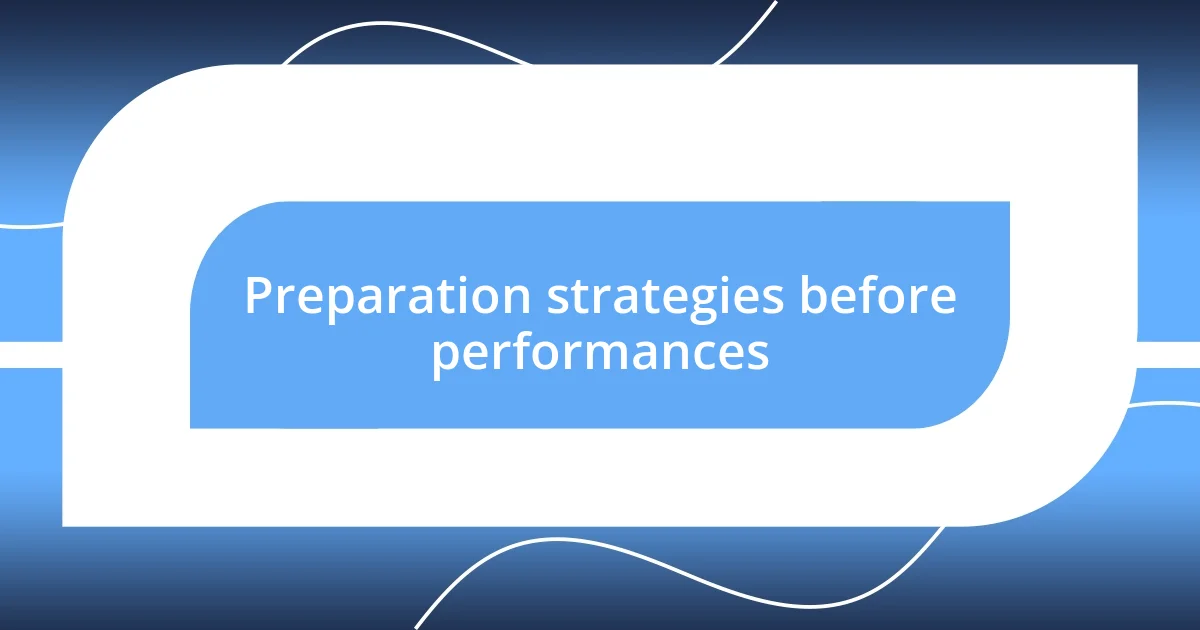
Preparation strategies before performances
Before any performance, I’ve found that having a solid plan can truly transform the experience. One strategy that has worked for me is setting specific goals for each practice session. Just a few days before a big show, I focus on perfecting a challenging scene or mastering a tricky line. Do you ever set goals for yourself? This targeted approach gives me a sense of accomplishment, reinforcing my confidence right before stepping into the spotlight.
Creating a routine has also been invaluable. I like to spend a few moments stretching and warming up my voice to shake off the tension. There was this one time when I almost skipped my routine because I was running late. I ended up feeling more anxious than usual on stage. Now, I remind myself that that little bit of preparation makes all the difference. It’s like giving myself permission to perform at my best.
Additionally, I firmly believe in the power of positive affirmations. I often recite phrases like, “I am prepared, and I will shine on that stage.” There was a performance where I felt particularly on edge, and repeating those affirmations surprisingly shifted my mindset. I could feel the warmth of confidence wash over me. Have you ever tried affirmations before a performance? They might just be the extra push you need to embrace the moment fully!
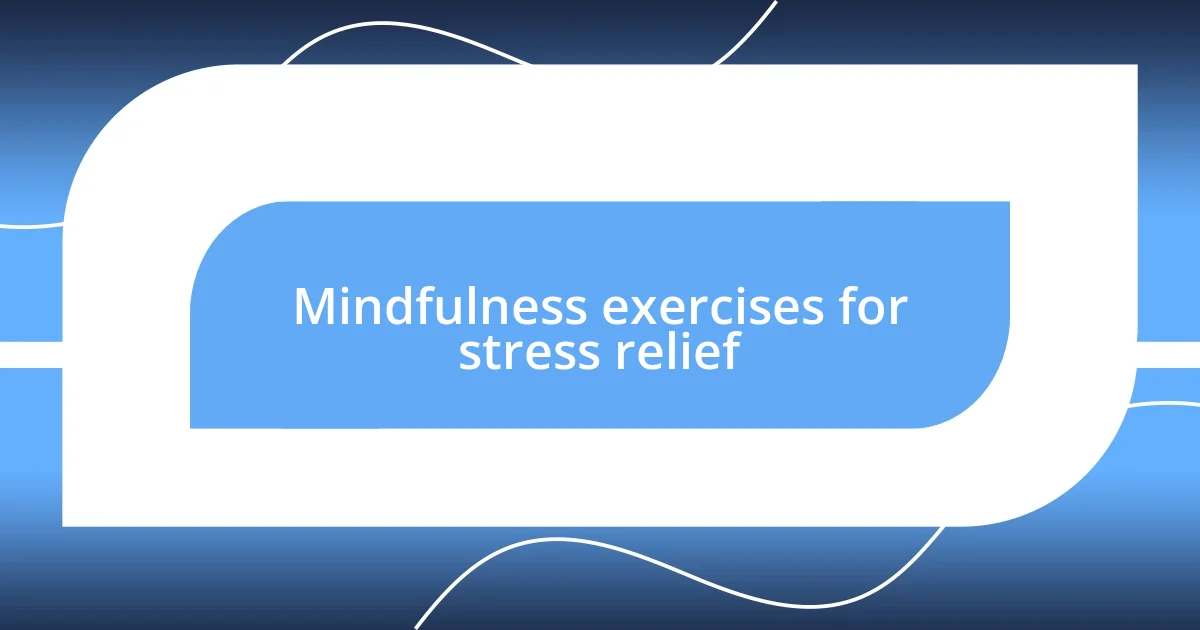
Mindfulness exercises for stress relief
One mindfulness exercise that I often revert to is progressive muscle relaxation. Before stepping on stage, I systematically tense and then release muscle groups, starting from my toes and working my way up. The first time I practiced this, I was astonished by how much tension I was holding in my shoulders. This exercise not only calmed my physical symptoms of anxiety but also brought a profound sense of awareness to my body.
Another effective technique for stress relief is mindful meditation. I try to set aside a few minutes each day to sit quietly and focus on my breath, allowing my thoughts to drift by without judgment. I recall a performance where I felt overwhelmed; after my brief meditation, I returned to my script with a clearer mind. Have you ever noticed how simply pausing and focusing on your breath can shift your perspective?
Finally, I’ve found that practicing gratitude can create a positive mindset. Each night, I jot down three things I’m grateful for, no matter how small they may seem. It might sound simple, but this exercise shifts my focus from performance anxiety to appreciation for the opportunity to share my art. Have you considered how gratitude could reshape your approach to performing? It’s a gentle reminder that every moment on stage is a chance to connect with others.
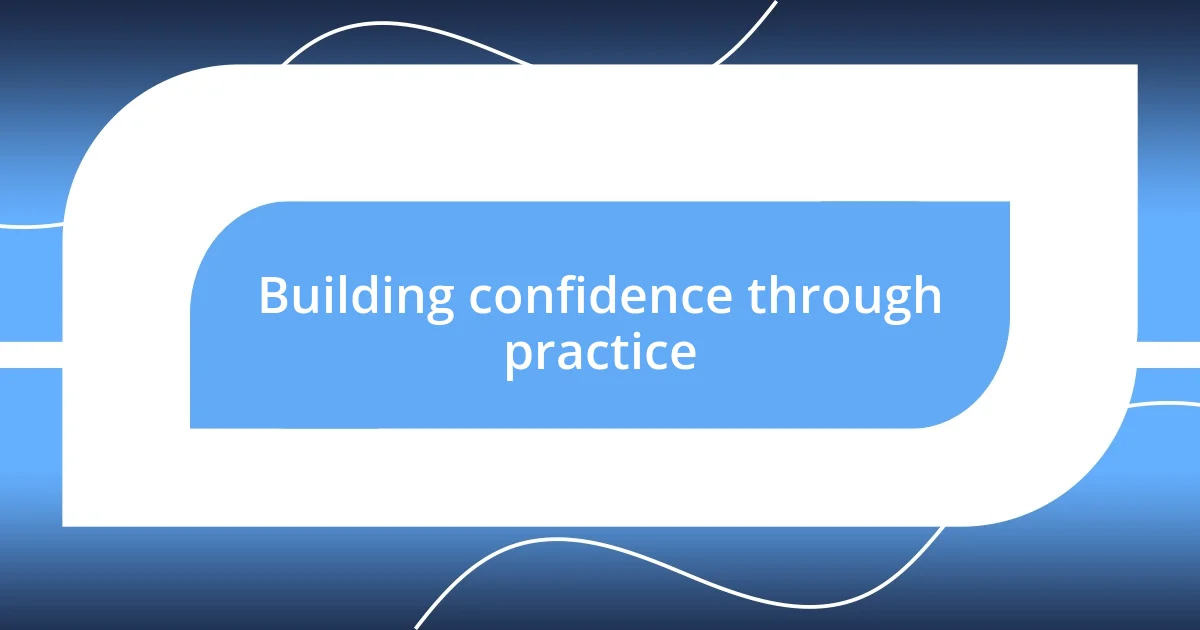
Building confidence through practice
Building confidence through consistent practice has been crucial in my journey to overcome stage fright. I remember the early days when I would rehearse in front of a mirror, nervously watching my reflections as if they could offer some reassurance. Did you ever notice how practicing in front of a familiar audience, even if it’s just yourself, can bridge the gap between anxiety and confidence? Over time, those reflections turned into strong reminders of my growth.
As my routine evolved, I began to incorporate feedback into my practice sessions. After each rehearsal, I’d record myself and play it back. Initially, it felt uncomfortable listening to my voice, but with each listen, I found areas for improvement. This process didn’t just fine-tune my performance; it helped me celebrate little victories along the way. Have you ever realized that acknowledging progress can spark a renewed sense of confidence? That’s exactly what happened for me.
Through intentional practice, I’ve developed a deeper understanding of my craft. I remember a pivotal moment during a performance where I suddenly blanked on my lines. Instead of panicking, I relied on my practice, recalling the countless hours spent honing each scene. This experience reinforced my belief that rehearsal is not just about memorization; it’s about building a reservoir of confidence I can tap into when the pressure mounts. How do you ensure your practice translates into performance? For me, it’s all about creating a safe space where learning and confidence can flourish together.
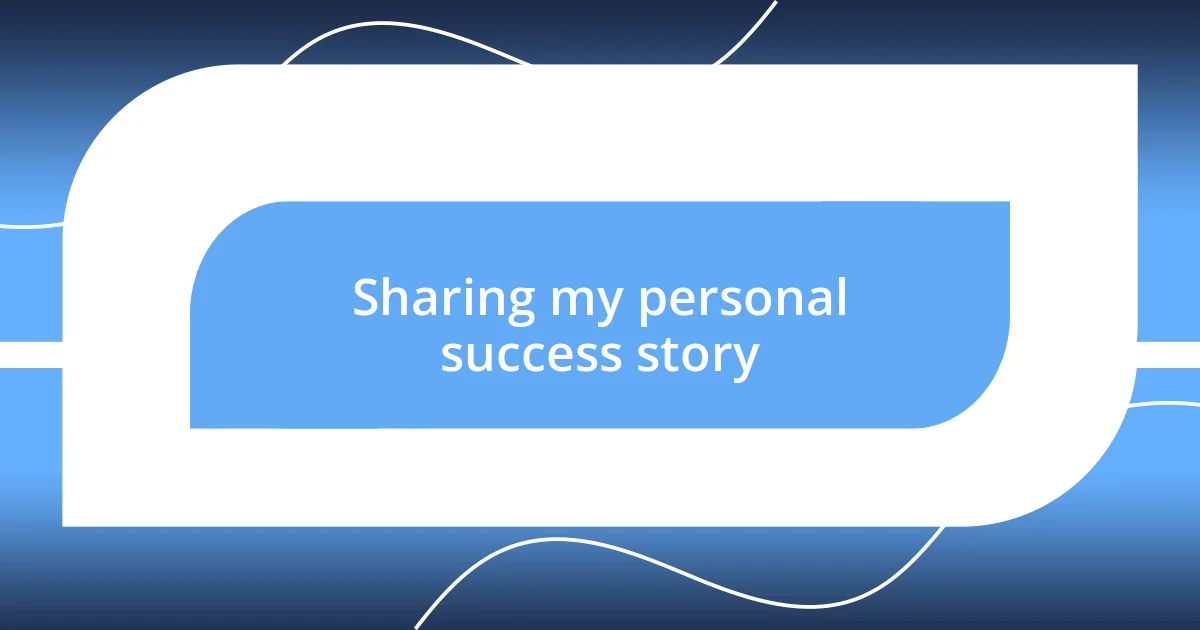
Sharing my personal success story
Stepping onto that stage for the first time felt like jumping into a pool of ice-cold water; my heart raced, and doubt clouded my mind. I remember holding my breath as I stood in the spotlight, all eyes on me. With my hands quivering, I took a moment to recall the countless hours I had spent preparing. Suddenly, I recognized that I wasn’t just facing an audience; I was sharing a piece of myself with them. This realization transformed my fear into exhilaration.
Another unforgettable moment was during a performance when I felt the dreaded panic creep in, and my mind went blank. I remembered the advice I had once received about grounding myself, so instead of freezing, I took a deep breath and spoke from my heart. It was an emotional rush – I felt a wave of support from the audience, almost as if they were cheering me on. Have you ever felt a room’s energy shift when you simply embrace the moment? That connection fueled my performance and forever shifted my perspective on stage fright.
Reflecting on my journey, I can’t help but feel gratitude for every stumble and every freezing moment. Those instances pushed me to grow, and I always ask myself: what would I have learned without those challenges? Now, after years of performing, I sincerely appreciate those nerve-wracking experiences, knowing they mold me into a more resilient artist. Have you taken the time to appreciate your own journey so far? It’s a beautiful path filled with lessons waiting to be embraced.
